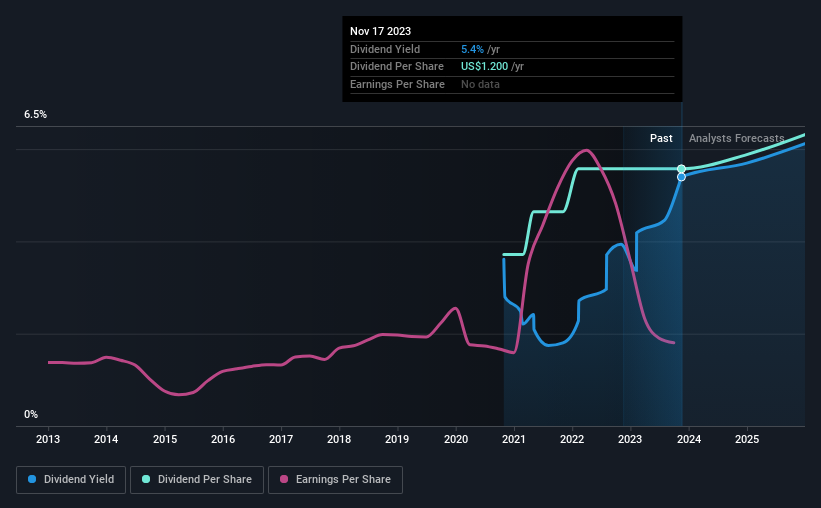Regional Management (NYSE:RM) Could Be A Buy For Its Upcoming Dividend
Regional Management Corp. (NYSE:RM) is about to trade ex-dividend in the next 3 days. The ex-dividend date is one business day before a company's record date, which is the date on which the company determines which shareholders are entitled to receive a dividend. It is important to be aware of the ex-dividend date because any trade on the stock needs to have been settled on or before the record date. Therefore, if you purchase Regional Management's shares on or after the 21st of November, you won't be eligible to receive the dividend, when it is paid on the 13th of December.
The company's next dividend payment will be US$0.30 per share, on the back of last year when the company paid a total of US$1.20 to shareholders. Based on the last year's worth of payments, Regional Management stock has a trailing yield of around 5.4% on the current share price of $22.24. We love seeing companies pay a dividend, but it's also important to be sure that laying the golden eggs isn't going to kill our golden goose! So we need to check whether the dividend payments are covered, and if earnings are growing.
Check out our latest analysis for Regional Management
Dividends are usually paid out of company profits, so if a company pays out more than it earned then its dividend is usually at greater risk of being cut. Regional Management paid out a comfortable 43% of its profit last year.
Generally speaking, the lower a company's payout ratios, the more resilient its dividend usually is.
Click here to see the company's payout ratio, plus analyst estimates of its future dividends.
Have Earnings And Dividends Been Growing?
Stocks with flat earnings can still be attractive dividend payers, but it is important to be more conservative with your approach and demand a greater margin for safety when it comes to dividend sustainability. If business enters a downturn and the dividend is cut, the company could see its value fall precipitously. That explains why we're not overly excited about Regional Management's flat earnings over the past five years. It's better than seeing them drop, certainly, but over the long term, all of the best dividend stocks are able to meaningfully grow their earnings per share.
Many investors will assess a company's dividend performance by evaluating how much the dividend payments have changed over time. Regional Management has delivered an average of 14% per year annual increase in its dividend, based on the past three years of dividend payments.
Final Takeaway
From a dividend perspective, should investors buy or avoid Regional Management? Earnings per share have been flat in recent years, although Regional Management reinvests more than half its earnings in the business, which could suggest there are some growth projects that have not yet reached fruition. In summary, Regional Management appears to have some promise as a dividend stock, and we'd suggest taking a closer look at it.
While it's tempting to invest in Regional Management for the dividends alone, you should always be mindful of the risks involved. Be aware that Regional Management is showing 4 warning signs in our investment analysis, and 1 of those is significant...
If you're in the market for strong dividend payers, we recommend checking our selection of top dividend stocks.
Have feedback on this article? Concerned about the content? Get in touch with us directly. Alternatively, email editorial-team (at) simplywallst.com.
This article by Simply Wall St is general in nature. We provide commentary based on historical data and analyst forecasts only using an unbiased methodology and our articles are not intended to be financial advice. It does not constitute a recommendation to buy or sell any stock, and does not take account of your objectives, or your financial situation. We aim to bring you long-term focused analysis driven by fundamental data. Note that our analysis may not factor in the latest price-sensitive company announcements or qualitative material. Simply Wall St has no position in any stocks mentioned.

